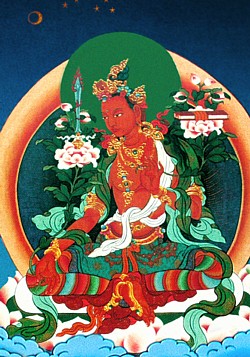Manjushri: Difference between revisions
Jump to navigation
Jump to search
No edit summary |
|||
| Line 20: | Line 20: | ||
*His Holiness [[Sakya Trizin]], [[Dzogchen Orgyen Chö Ling]], London, UK, [August/September?] 1978 | *His Holiness [[Sakya Trizin]], [[Dzogchen Orgyen Chö Ling]], London, UK, [August/September?] 1978 | ||
*His Holiness Sakya Trizin, Cornwall, UK, 29 March 1989 | *His Holiness Sakya Trizin, Cornwall, UK, 29 March 1989 | ||
*[[Khenpo Jikme Phuntsok]], [[Lerab Ling]], 30 August 1993 | *[[Khenpo Jikme Phuntsok]], [[Lerab Ling]], 30 August 1993 | ||
*His Holiness Sakya Trizin, Lerab Ling, 2 August 2014 | *His Holiness Sakya Trizin, Lerab Ling, 2 August 2014 | ||
*[[Shechen Rabjam Rinpoche]], Lerab Ling, 17 August 2019: [[White Manjushri]] | |||
==Further Reading== | ==Further Reading== | ||
Revision as of 15:28, 17 August 2019

Mañjushri (Skt. Mañjuśrī; Tib. འཇམ་དཔལ་, འཇམ་དཔལ་དབྱངས་, Jampalyang; Wyl. 'jam dpal dbyang; Chi.: 文殊, Wenshu, Pin. Wénshū)) or Mañjughosha (Skt. Mañjughoṣa; Tib. འཇམ་དབྱངས་, Jamyang; Wyl. ‘jam dbyangs; 'the Gentle Voiced') is
- one of the eight great bodhisattvas who were the closest disciples of the Buddha. In this form, he sometimes appears whitish-green in colour and holding a lily to symbolize renunciation of the destructive emotions.
- the embodiment of the knowledge and wisdom of all the buddhas, traditionally depicted with a sword in his right and a text in his left hand.
Jamyang Khyentse Wangpo says:
- In definitive terms, Mañjushri, you are now, and from the very beginning you have always been, a genuine buddha, in whom all the qualities of abandonment and realization are totally perfected, because you completely traversed all ten bhumis, such as the Joyous and so on, and purified the two obscurations, together with any latent habitual tendencies, many incalculable aeons ago. Nevertheless, from a merely provisional perspective, you appear as the foremost of all the bodhisattvas, and demonstrate the means of training as a bodhisattva in the presence of all the victorious ones and their heirs throughout the ten directions.
- Moreover, from the perspective of the mantrayana, there is no doubt whatsoever that you, Mañjushri, are a buddha. In fact, this is even stated in the sutras. In the Sutra of the Array of Mañjushri’s Pure Land, for example, it says you have completed the ten bhumis. And in two other sutras—the Shurangama-samadhi Sutra and the Angulimala Sutra—you are clearly referred to as a buddha. [1]
Notes
Teachings Given to the Rigpa Sangha
- Orgyen Tobgyal Rinpoche, Lerab Ling, 30 May 2011
Empowerments of Manjushri Given to the Rigpa Sangha
- His Holiness Sakya Trizin, Dzogchen Orgyen Chö Ling, London, UK, [August/September?] 1978
- His Holiness Sakya Trizin, Cornwall, UK, 29 March 1989
- Khenpo Jikme Phuntsok, Lerab Ling, 30 August 1993
- His Holiness Sakya Trizin, Lerab Ling, 2 August 2014
- Shechen Rabjam Rinpoche, Lerab Ling, 17 August 2019: White Manjushri
Further Reading
- Jamgön Mipham, A Garland of Jewels, (trans. by Lama Yeshe Gyamtso), Woodstock: KTD Publications, 2008
Internal Links
- Arapatsana mantra
- Wutai Shan
- Chanting the Names of Manjushri
- Black Manjushri
- White Manjushri
- Yamantaka